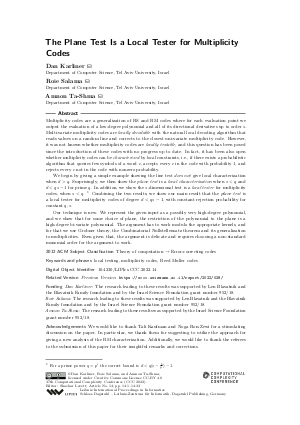@InProceedings{karliner_et_al:LIPIcs.CCC.2022.14,
author = {Karliner, Dan and Salama, Roie and Ta-Shma, Amnon},
title = {{The Plane Test Is a Local Tester for Multiplicity Codes}},
booktitle = {37th Computational Complexity Conference (CCC 2022)},
pages = {14:1--14:33},
series = {Leibniz International Proceedings in Informatics (LIPIcs)},
ISBN = {978-3-95977-241-9},
ISSN = {1868-8969},
year = {2022},
volume = {234},
editor = {Lovett, Shachar},
publisher = {Schloss Dagstuhl -- Leibniz-Zentrum f{\"u}r Informatik},
address = {Dagstuhl, Germany},
URL = {https://drops.dagstuhl.de/entities/document/10.4230/LIPIcs.CCC.2022.14},
URN = {urn:nbn:de:0030-drops-165761},
doi = {10.4230/LIPIcs.CCC.2022.14},
annote = {Keywords: local testing, multiplicity codes, Reed Muller codes}
}

 Creative Commons Attribution 4.0 International license
Creative Commons Attribution 4.0 International license


















